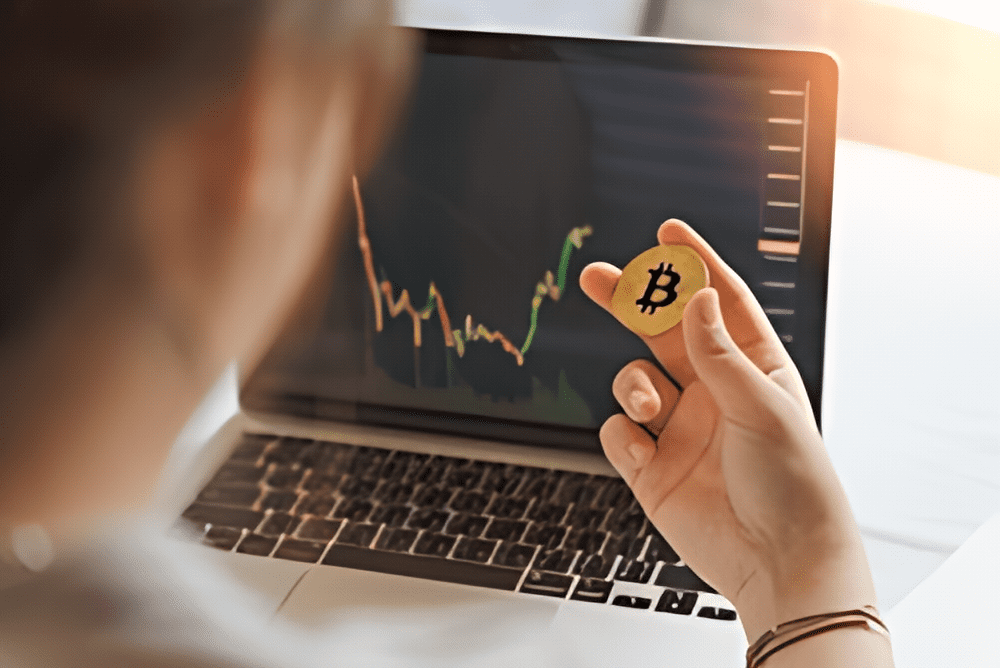The Bitcoin futures market, with its blend of new-age digital currency and traditional trading mechanisms, is witnessing a surge in activity. Key exchanges and institutional players are shaping its trajectory, highlighting the market’s evolving dynamics. To efficiently invest in Bitcoin, you may use a reliable AI trading bot.
Bitcoin Futures: The Deep Dive
Bitcoin futures represent a pivotal step in the maturation of cryptocurrency markets, offering a bridge between the traditionally regulated financial sector and the relatively nascent world of digital currencies. At their core, Bitcoin futures function like any other futures contracts, albeit with Bitcoin as the underlying asset. Unlike directly buying and selling Bitcoin, where ownership of the actual currency changes hands, futures are standardized contracts that allow individuals to buy or sell Bitcoin at a predetermined price at a future date.
Distinguishing between the spot market and futures market is crucial. In the spot market, transactions are settled “on the spot,” meaning immediate delivery of the asset, in this case, Bitcoin. Futures markets, on the other hand, focus on the delivery of the asset at a future date. What makes Bitcoin futures compelling is their role in mitigating Bitcoin’s famed volatility.
The benefits of Bitcoin futures are manifold. One of the most significant advantages is price discovery. Futures markets tend to be more liquid and are often where the “true” price of an asset gets determined, providing greater transparency to the overall market. Further, the inclusion of Bitcoin futures has led to increased liquidity in the cryptocurrency sector. By attracting institutional investors and facilitating more significant trading volumes, futures help reduce the gap between bid and ask prices, making transactions smoother for all market participants.
However, while the advantages are clear, Bitcoin futures are not without their challenges. Regulatory uncertainties have been a persistent cloud over the industry. Different jurisdictions have varied approaches to the asset, leading to a fragmented global landscape. This unpredictability can deter potential investors and make compliance a moving target for trading platforms. Another concern is the potential for market manipulation. Given the relative youth of the cryptocurrency sector, there’s an underlying fear that large players could unduly influence prices. Lastly, while leverage, or the ability to control a large position with a relatively small amount of capital, is a feature of futures markets, it’s a double-edged sword. It can amplify gains but can also magnify losses, especially in a volatile market like Bitcoin.
Key Players in the Bitcoin Futures Market
The Bitcoin futures market, much like the broader cryptocurrency ecosystem, is defined by its diverse participants. Among them, a few major exchanges have risen to prominence, carving out significant market share and setting industry standards.
CME Group, short for the Chicago Mercantile Exchange Group, was one of the first significant exchanges to throw its hat into the Bitcoin futures ring. Recognized for its legacy in the traditional futures market, CME’s venture into the Bitcoin realm was a nod to the digital currency’s growing legitimacy. Their futures contracts have been designed to cater to both institutional and individual investors, providing a reliable platform for trading. The contracts are cash-settled, meaning no actual Bitcoins are transferred, but instead, the difference in price is paid out in cash, a mechanism that appeals to traditional investors.
CBOE Global Markets, or the Chicago Board Options Exchange, was another early entrant. Renowned as the largest options exchange in the U.S., CBOE’s foray into Bitcoin futures marked a significant milestone for the cryptocurrency community. Although they have since halted the addition of new Bitcoin futures contracts, their initial involvement was indicative of the potential they saw in the sector.
Then there’s Bakkt, a platform that garnered significant attention due to its unique approach. Unlike CME and CBOE, which offer cash-settled futures, Bakkt introduced physically-settled Bitcoin futures. This means that upon the contract’s expiration, the holder receives actual Bitcoin rather than the cash equivalent. Such a mechanism emphasizes the tangible nature of cryptocurrency and can be viewed as a more direct interaction with the underlying asset.
In addition to these major exchanges, institutional investors have also begun to play a more pronounced role in the Bitcoin futures market. Their involvement signifies a shift in perception. Previously skeptical or cautious, many institutional entities are now viewing Bitcoin futures as a viable investment avenue, a trend that could further bridge the gap between traditional finance and the world of digital currencies.
Conclusion
The pivotal roles played by major exchanges and institutional participants emphasize the growing symbiosis between Bitcoin futures and mainstream finance. Their collective actions hint at a future where cryptocurrency seamlessly intertwines with traditional investment avenues.
